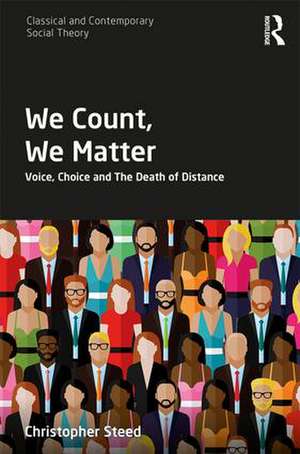We Count, We Matter: Voice, Choice and the Death of Distance: Classical and Contemporary Social Theory
Autor Christopher Steeden Limba Engleză Hardback – 16 feb 2018
Din seria Classical and Contemporary Social Theory
-
 Preț: 310.12 lei
Preț: 310.12 lei -
 Preț: 281.98 lei
Preț: 281.98 lei -
 Preț: 155.43 lei
Preț: 155.43 lei -
 Preț: 309.20 lei
Preț: 309.20 lei -
 Preț: 326.49 lei
Preț: 326.49 lei -
 Preț: 287.82 lei
Preț: 287.82 lei -
 Preț: 363.67 lei
Preț: 363.67 lei -
 Preț: 317.81 lei
Preț: 317.81 lei -
 Preț: 202.64 lei
Preț: 202.64 lei -
 Preț: 324.87 lei
Preț: 324.87 lei -
 Preț: 310.71 lei
Preț: 310.71 lei -
 Preț: 449.41 lei
Preț: 449.41 lei - 26%
 Preț: 765.77 lei
Preț: 765.77 lei - 26%
 Preț: 763.39 lei
Preț: 763.39 lei - 14%
 Preț: 341.58 lei
Preț: 341.58 lei - 18%
 Preț: 1002.18 lei
Preț: 1002.18 lei -
 Preț: 489.26 lei
Preț: 489.26 lei -
 Preț: 489.26 lei
Preț: 489.26 lei - 9%
 Preț: 934.94 lei
Preț: 934.94 lei -
 Preț: 469.34 lei
Preț: 469.34 lei - 18%
 Preț: 1003.43 lei
Preț: 1003.43 lei -
 Preț: 481.20 lei
Preț: 481.20 lei - 12%
 Preț: 325.34 lei
Preț: 325.34 lei - 18%
 Preț: 1008.97 lei
Preț: 1008.97 lei -
 Preț: 469.34 lei
Preț: 469.34 lei - 26%
 Preț: 816.44 lei
Preț: 816.44 lei - 26%
 Preț: 821.13 lei
Preț: 821.13 lei - 18%
 Preț: 1001.07 lei
Preț: 1001.07 lei - 18%
 Preț: 1000.45 lei
Preț: 1000.45 lei - 18%
 Preț: 1005.31 lei
Preț: 1005.31 lei - 18%
 Preț: 1000.27 lei
Preț: 1000.27 lei -
 Preț: 381.51 lei
Preț: 381.51 lei -
 Preț: 469.34 lei
Preț: 469.34 lei - 18%
 Preț: 836.89 lei
Preț: 836.89 lei -
 Preț: 469.34 lei
Preț: 469.34 lei - 26%
 Preț: 763.13 lei
Preț: 763.13 lei - 28%
 Preț: 821.53 lei
Preț: 821.53 lei - 18%
 Preț: 1115.84 lei
Preț: 1115.84 lei - 18%
 Preț: 1003.12 lei
Preț: 1003.12 lei
Preț: 998.71 lei
Preț vechi: 1217.94 lei
-18% Nou
Puncte Express: 1498
Preț estimativ în valută:
191.10€ • 200.06$ • 158.12£
191.10€ • 200.06$ • 158.12£
Carte tipărită la comandă
Livrare economică 07-21 aprilie
Preluare comenzi: 021 569.72.76
Specificații
ISBN-13: 9781138306219
ISBN-10: 1138306215
Pagini: 200
Dimensiuni: 156 x 234 x 18 mm
Greutate: 0.41 kg
Ediția:1
Editura: Taylor & Francis
Colecția Routledge
Seria Classical and Contemporary Social Theory
Locul publicării:Oxford, United Kingdom
ISBN-10: 1138306215
Pagini: 200
Dimensiuni: 156 x 234 x 18 mm
Greutate: 0.41 kg
Ediția:1
Editura: Taylor & Francis
Colecția Routledge
Seria Classical and Contemporary Social Theory
Locul publicării:Oxford, United Kingdom
Public țintă
Postgraduate and ProfessionalCuprins
Setting the Scene: Waking the Sleeping Dog - A First Draft of History 1. Trump Cards 2. The Irrelevance of Geography and The Forces of Change 3. Forces of Reaction (Identity, Place and Familiar Face) 4. Forces of Reaction (Immigration Panic, Walls and Bridges) 5. Forces of Reaction and The Flight from The Impersonal 6. ‘Weeks When Decades Happen’: Alienation Old and New 7. Lonely Exodus of the 21st Century: The Social Cost of Disconnection 8. ‘So Near Yet So Far’: Simmel, The Stranger and The Estranged 9. The Rise of Voice and Choice (Thinking Like a Consumer) 10. ‘Facework’ nd the Rise of Voice and Choice 11. The Battles We Fought (The Respect, Human Rights and Dignity Agendas) 12. From Honour Society to Voice and Choice Society, Postscript: Lord of The Lies: The Image System and A Theory of Emotional Cognition, Index
Recenzii
"A bold and wide-ranging book which isn’t afraid to look at the big picture and relate recent events to wider social trends."
Linda Woodhead, Lancaster University, UK.
"In a world that is increasingly prey to populism and revolt, and is at the same time replete with the forces of alienation and marginalisation, we need clear-headed and far-sighted thinkers to chart the landscape that lies before us. Christopher Steed assesses the contemporary culture in which we find ourselves, and offers helpful critiques that will act as important guideposts for our futures. Steed’s accessible and penetrating insights are a must for all those concerned with mapping the way forward."
The Very Reverend Professor Martyn Percy, Dean of Christ Church, Oxford, UK.
"What lies behind the political upheavals of Brexit, Trump and the rise of populist political parties? Chris Steed explores the paradox of a world that is both becoming smaller and leaving millions at the mercy of faceless forces."
John Denham, University of Winchester, UK.
Linda Woodhead, Lancaster University, UK.
"In a world that is increasingly prey to populism and revolt, and is at the same time replete with the forces of alienation and marginalisation, we need clear-headed and far-sighted thinkers to chart the landscape that lies before us. Christopher Steed assesses the contemporary culture in which we find ourselves, and offers helpful critiques that will act as important guideposts for our futures. Steed’s accessible and penetrating insights are a must for all those concerned with mapping the way forward."
The Very Reverend Professor Martyn Percy, Dean of Christ Church, Oxford, UK.
"What lies behind the political upheavals of Brexit, Trump and the rise of populist political parties? Chris Steed explores the paradox of a world that is both becoming smaller and leaving millions at the mercy of faceless forces."
John Denham, University of Winchester, UK.
Descriere
This book examines the contemporary reaction against the establishment or ‘the system’ in terms of a new divide between those who wish to see an interconnected world, and those who seek distance through protectionism and opposition to immigration. An analysis that draws on the notion of ‘face’ to explore reactions to processes such as automation and globalisation, the author considers people’s new conception of themselves as networked individuals, able to respond to a sense of alienation and air their grievances on social media, and discusses our move towards a type of society characterised not by honour and dishonour, or right and wrong, but by voice and choice.
